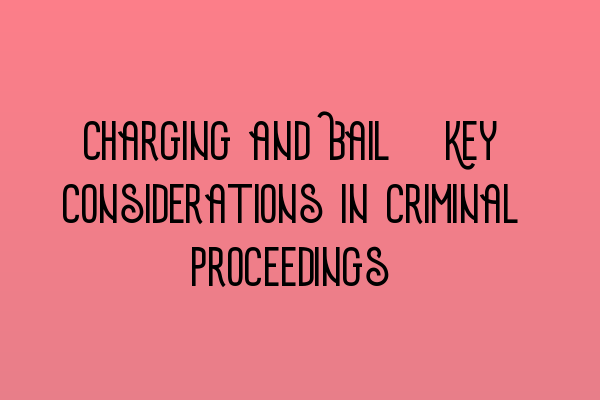Charging and Bail: Key Considerations in Criminal Proceedings
As a prominent law firm specializing in Criminal Law and Practice in the UK, SQE Criminal Law & Practice understands the complexities and nuances involved in criminal proceedings. One critical aspect of these proceedings is charging and bail, which require careful consideration to ensure a fair and just legal process. In this blog post, we will delve into the key considerations surrounding charging and bail, shedding light on important factors that both defendants and solicitors should be aware of.
Charging: The Foundation of Criminal Proceedings
Charging is the initial step where the prosecuting authority, usually the police or Crown Prosecution Service (CPS), officially accuses an individual of committing a criminal offense. This accusation serves as the foundation for subsequent legal proceedings, making it a pivotal point in the criminal justice system. However, thorough consideration must be given to several factors during the charging process to safeguard the rights of the accused and promote a fair trial.
1. Sufficient Evidence: Before charging an individual, the prosecuting authority must ensure that they possess sufficient evidence to support the allegations. This evidence should be reliable, admissible in court, and capable of meeting the required standard of proof. Failing to meet these criteria could result in a weak case, leading to acquittals or even wrongful convictions.
2. Proper Disclosure: Proper disclosure of evidence is a fundamental principle of criminal law. The prosecution must disclose all relevant evidence to the defense in a timely manner, enabling them to prepare an appropriate defense strategy. Failure to disclose potential exculpatory evidence can lead to miscarriages of justice, undermining the integrity of the legal process.
3. Legal Professionalism: Solicitors representing the prosecution need to conduct thorough investigations, ensuring that they adhere to ethical and professional standards. This includes avoiding biased or misleading conduct that could undermine the credibility of the charges brought against the accused. Legal professionals are duty-bound to act impartially and present a balanced case to the court.
Bail: Presumption of Innocence and Public Safety
Once an individual has been charged, the question of bail arises. Bail refers to the release of a defendant from custody while awaiting trial, with conditions attached to ensure their presence in court and maintain public safety. The decision to grant or deny bail relies on balancing the presumption of innocence with the potential risks associated with releasing an individual before trial.
1. Presumption of Innocence: In line with the principle of a fair trial, every defendant is presumed innocent until proven guilty. Granting bail is a reflection of this presumption, allowing individuals to continue their daily life and actively participate in their legal defense. Bail should only be refused when there are substantial grounds to believe the defendant poses a flight risk, could interfere with witnesses, or may commit further offenses.
2. Risk Assessment: The court conducts a thorough risk assessment before deciding whether to grant bail or impose conditions. Factors considered include the seriousness of the offense, the defendant’s criminal history, the likelihood of the defendant reoffending, and potential harm to the public or witnesses. Bail conditions, such as reporting to a police station or electronic monitoring, can be imposed to mitigate risks.
3. Exceptional Circumstances: In some cases, exceptional circumstances may warrant the refusal of bail, such as when there are substantial concerns for public safety or a high risk of interfering with the course of justice. The decision to deny bail must be reasonable, proportionate, and necessary. Legal representation plays a crucial role in advocating for the defendant’s rights and ensuring a fair assessment by the court.
Ensuring a Just Legal Process
Charging and bail are fundamental aspects of criminal proceedings that require careful consideration to maintain the integrity of the legal process. From the initial stage of charging, prosecutors must ensure they have sufficient evidence, properly disclose it, and act with professionalism. Similarly, when determining bail, the court must balance the presumption of innocence with the risks involved, always striving for fairness and justice. Solicitors specializing in Criminal Law and Practice, like SQE Criminal Law & Practice, play a vital role in upholding these principles and safeguarding the rights of defendants.
If you find yourself facing criminal charges or require expert legal advice on charging and bail, contact SQE Criminal Law & Practice Uk today. Our experienced solicitors are dedicated to protecting your rights and securing the best possible outcome in your case. Ensure a fair and just legal process by entrusting your defense to our esteemed team of professionals. Your future is our priority.
